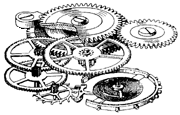

![]() t was Henry David Thoreau
who issued the famous dictum: “Let your life be a counter-friction to stop
the machine.” Now, I'm no Luddite—you wouldn’t be reading this on
the Internet if I were. I believe that technology has the capacity
to enhance our lives; to enrich us in mind and spirit, and to provide us
with an unprecedented level of material prosperity. The mechanism Thoreau
railled against is actually a system, and an unquestioning acceptance
of things that seem so profoundly “true” that they are never subjected
to the rigors of critical intelligence. In this way, social, political
and economic structures—even bad ones—are reproduced from one generation
to the next without the slightest indication that they might be altered
or improved: “All is for the best in this best of all possible worlds,”
the old saying goes.
t was Henry David Thoreau
who issued the famous dictum: “Let your life be a counter-friction to stop
the machine.” Now, I'm no Luddite—you wouldn’t be reading this on
the Internet if I were. I believe that technology has the capacity
to enhance our lives; to enrich us in mind and spirit, and to provide us
with an unprecedented level of material prosperity. The mechanism Thoreau
railled against is actually a system, and an unquestioning acceptance
of things that seem so profoundly “true” that they are never subjected
to the rigors of critical intelligence. In this way, social, political
and economic structures—even bad ones—are reproduced from one generation
to the next without the slightest indication that they might be altered
or improved: “All is for the best in this best of all possible worlds,”
the old saying goes.
And yet, our history is full of individuals who would not remain silent in the face of injustice and oppression: Patrick Henry, Mercy Otis Warren, Daniel Shays (who led the Massachusetts rebellion which bears his name), John Brown, William Lloyd Garrison, Frederick Douglass, and Eugene V. Debs, to name but a few.
The “machine-stoppers” have always believed in the power and dignity of the human spirit; that the measure of man transcends the prerogatives of governments.
[STAY TUNED FOR A BIOGRAPHY OF FREE SPEECH ACTIVIST MARIO SAVIO, PICTURED BELOW]
Rage
Against the Machine’s Tom Morello
interviews scholar and critic Noam Chomsky